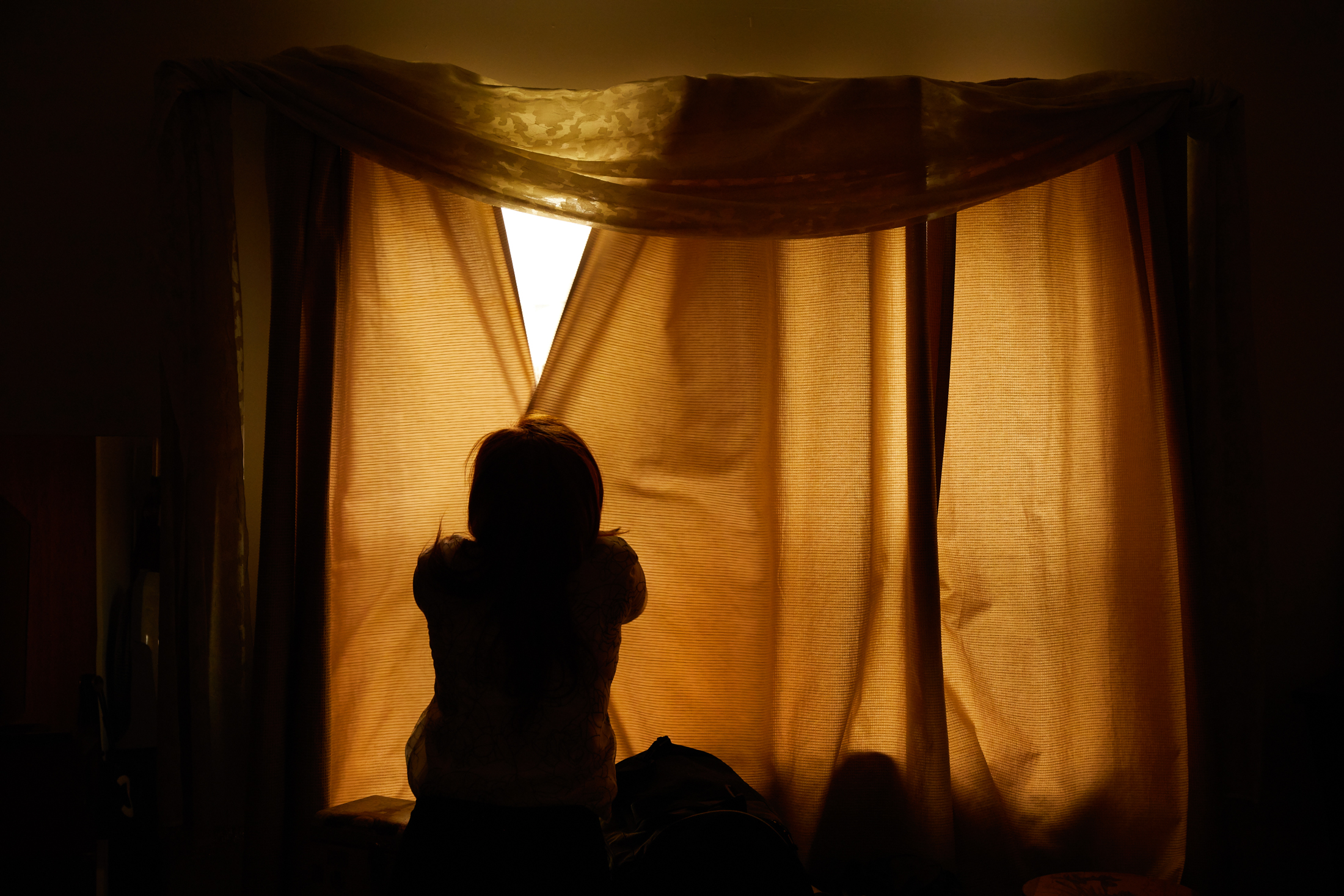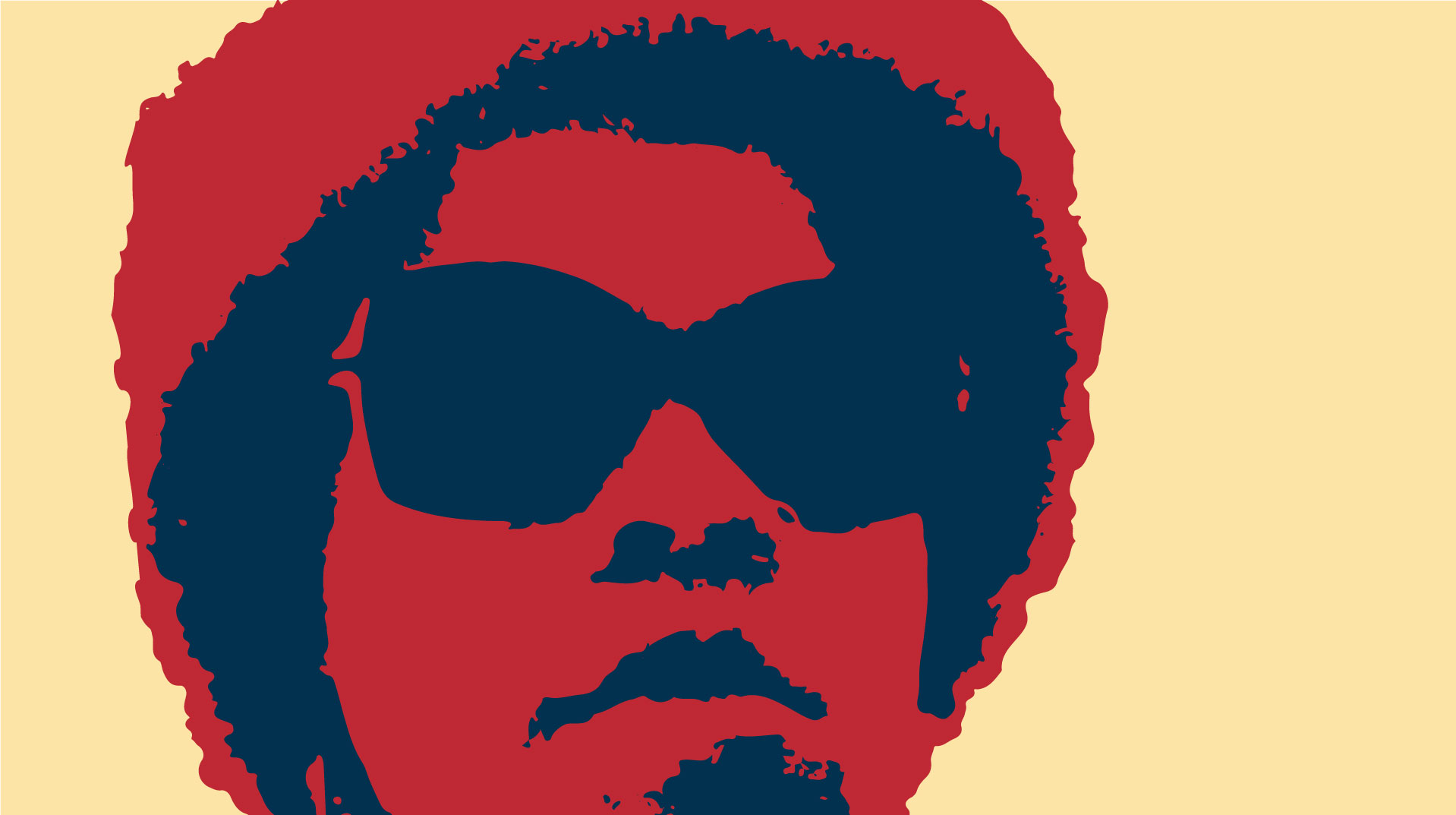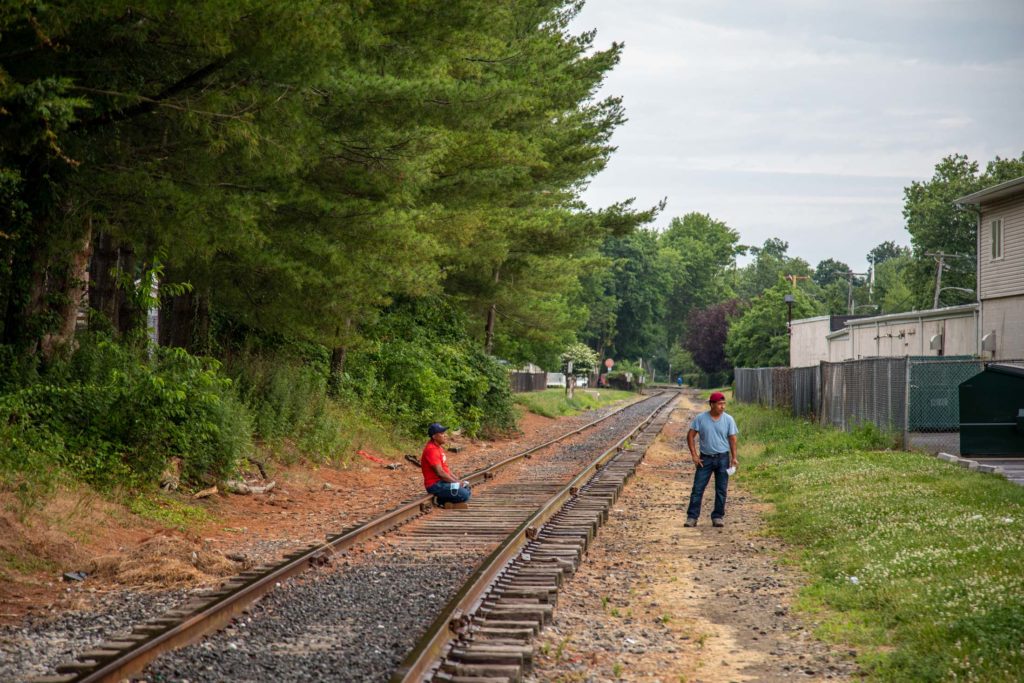
Driving along Throckmorton street off route 9 in central New Jersey, one sees the railroad tracks appearing almost out of nowhere, side by side with the road, out of the shrubbery and trees that have grown like a hood around it.
The immigrant workers of Freehold Borough call it La Vía—the Way; for years they have walked along these tracks from neighboring areas to the center of town to gather and look for work. You see them walking or sitting along the embankment—Hispanic* men, weather-beaten and carrying backpacks, distinguishable now from pre-pandemic days by blue surgical masks donned to protect against COVID-19. In the early 2000s when they first began to make their presence felt, Freehold’s Hispanic laborers congregated in the town’s unofficial ‘muster zone,’ a shady patch alongside the tracks where workers waited to be picked up by contractors and anyone else hiring day labor. These days, they cluster in the parking lot of a 6/12 convenience store that abuts the railroad, or outside the bus station and the Rita’s Ices adjacent to it. The gathering places have shifted over time, but workers continue to flock to Freehold, some laying down roots, others passing through. After 9/11 and the passing of the Homeland Security Act, and as the border between the U.S. and Mexico becomes increasingly impermeable, many who would otherwise have returned home have stayed.
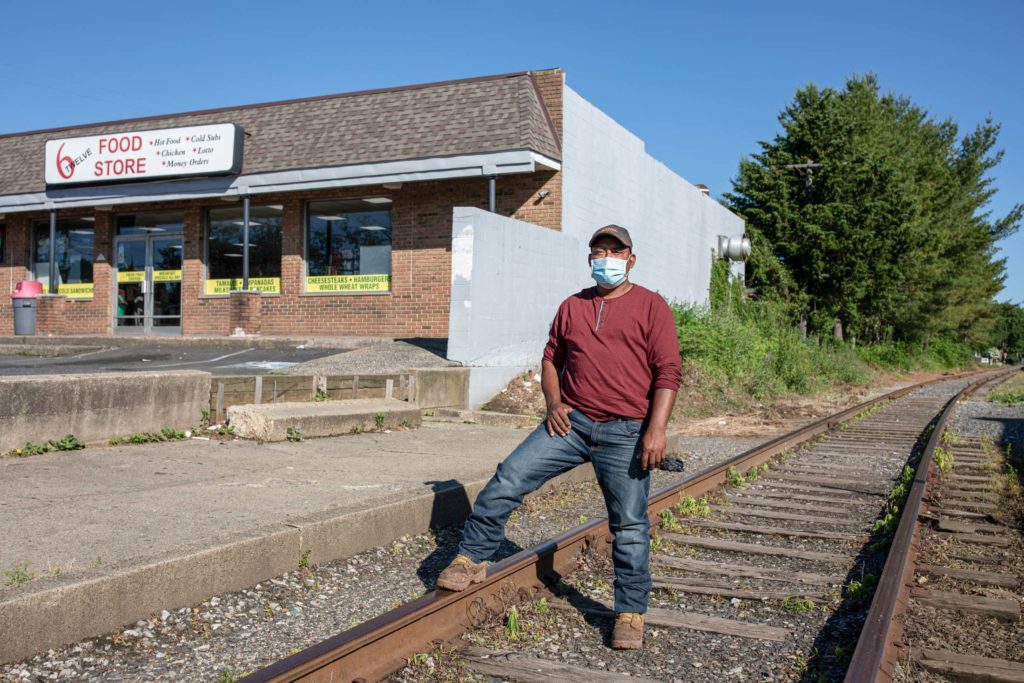
Freehold Borough—famous as Bruce Springsteen’s childhood home—is a tiny, historic town with a revolutionary past. A sign along the railroad on Throckmorton street commemorates the Battle of Monmouth, fought nearby in June 1778. One parallel street away from the 6/12 where the workers gather, is Main street and a picturesque downtown, with classical columns and the plaza at the Hall of Records on one end. Leaving the center of town, the street opens onto a neighborhood of pretty Victorian homes with restored sidings and wide-open porches and hanging flower baskets. In the 90s, Freehold became a hub for immigrant farm labor. By 2010, nearly half of its 12,000 residents were undocumented Hispanic workers and their families. Their numbers have only risen since then, crowded into the town’s barely 2-square mile radius.
Like elsewhere in the country, the pandemic shattered the fragile ecosystem of daily wage work in Freehold, subjecting its undocumented community to extreme loss of work and income. Shortly after March 14, when New Jersey declared a state of emergency in response to the pandemic, the local food pantry scrambled to meet a spike in need. Their work came to a premature halt when an infection was traced on-site. Rita Dentino, executive director of Casa Freehold, a grassroots advocacy and immigrant labor rights group, got a call asking for help. Would they take over food distribution until the food pantry could re-open? Even before the phone call, Dentino and her volunteers had begun drumming up efforts to meet food needs for the workers it serves. Now their offices became a food distribution center overnight. Town officials stepped in to provide an outdoor tent. The mayor paid a visit. Markers were placed on the ground six feet apart to meet social distancing requirements. Donations began coming in, and volunteers began dispatching 200 ‘survival boxes’ a week.
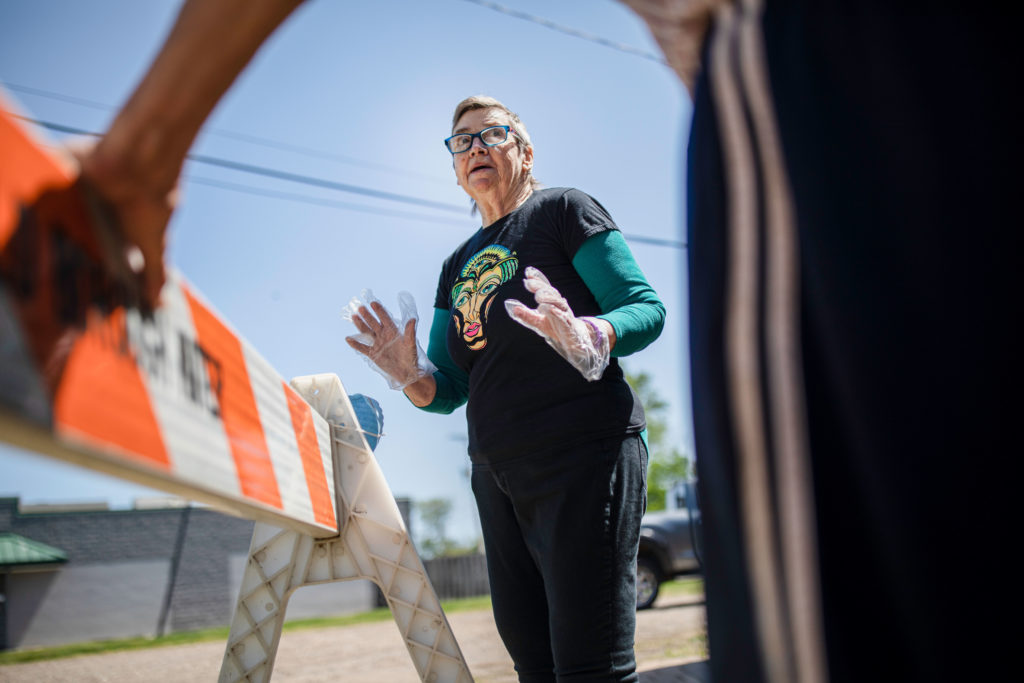
The pandemic put the town’s administration and Casa Freehold in the rare position of forming an alliance for purposes of contact tracing and food distribution—a critical development given a history of clashing over immigrant labor issues. Dentino leveraged the situation. She asked the town for permission to hang a banner with “Casa Freehold” emblazoned across it outside the tent. Featuring a painting of an immigrant worker in front of the Statue of Liberty, and the words ‘the job dignifies the man,’ the sign is visible from the street, placing the group and the workers they represent squarely in the public eye.
Dignity and jobs are not the only things that have been lost in Freehold, and lack of food is not the only looming health threat. Studies have established that low-income communities and communities of color are at persistently higher risk of falling severely ill from the coronavirus due to poor access to health benefits and economic challenges. The virus’ impact in Freehold is similarly disproportionate—by June, 72% of the town’s 404 positive cases self-reported as Latino/Hispanic. While the town addressed the community’s most urgent needs during the lockdown by distributing free food and household supplies, and providing access to free hospital care for qualifying COVID-19 patients, the inequities that the pandemic exposed also raised the question of how far Freehold’s daily wage workers have come in their struggle for legitimacy—in the legal void they occupy as undocumented immigrants, this is hard to measure.
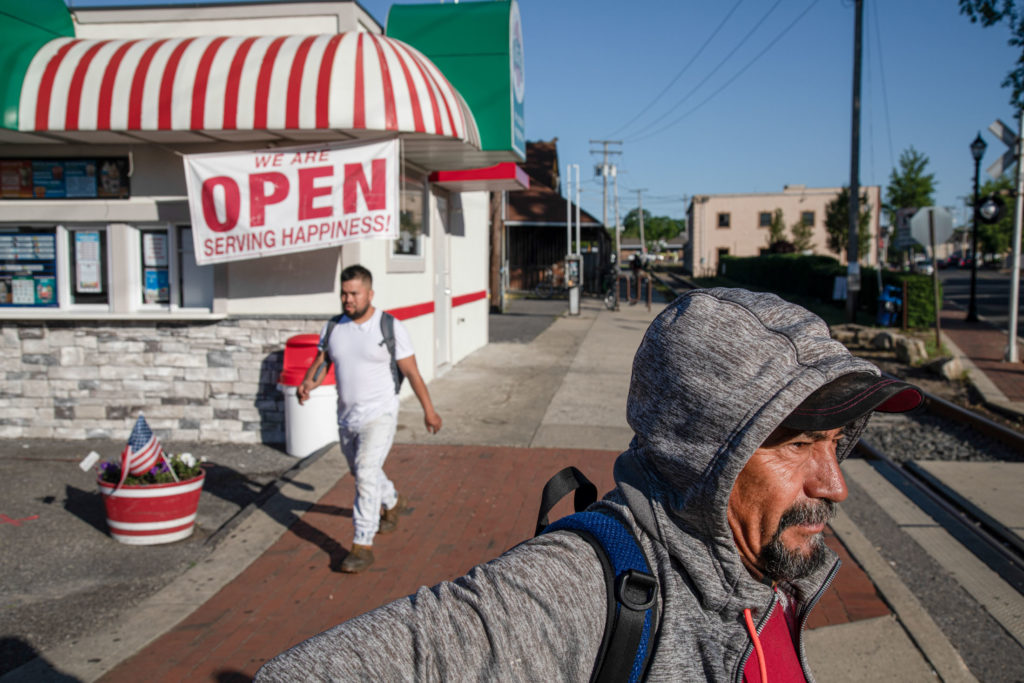
The quarantine had been in place for two months when I visited Dentino on a warm spring afternoon in her office on Jackson Street.
Volunteers were entering and leaving at a staggered pace, trying to remain efficient while observing social distancing. A retired schoolteacher in a Knights of Columbus shirt and a couple of high schoolers moved boxes containing supplies, and a lean old man with a flowing white beard in a loose shirt and necklace, whom Dentino called her ‘invisible angel’, unloaded pizza cartons from his car. Volunteers milled around the tent, arranging donations on tables. She waved me into the front office where she was on the phone with a pharmacist, trying to organize a prescription for Federico, a 66-year-old Mexican car upholsterer who worked landscaping jobs in the area. He had just been released from CentraState Medical Center after treatment for COVID-19. His bill had come to over $460; Dentino was able to get him an alternate drug that was being offered free for the month. A young Guatemalan man, Wagner Menendez, came over to pick up food and deliveries to be taken to Federico’s apartment-–a converted single family home-–where he was quarantining in the single room he rents, like many day laborers in town who do not have a family here. Deliveries are typically left outside the front door, and another resident in the building picks them up and leaves them outside the quarantined patient’s door.
Dentino handed Wagner cash to buy the medicines. A state-financed program covers most uninsured patients treated for COVID-19 at CentraState, but not the cost of prescriptions, for which Casa Freehold uses funds raised through grants awarded by non-profits like the New Jersey Pandemic Relief Fund and relief gift cards issued by worker rights groups like the National Domestic Workers Alliance. One of the first things she did when Federico called to tell her he was sick, was to ask if he had enough money on his phone. “Their phones are their lifelines,” she told me, to communicate with their families, with employers, and to reach out for medical help, even more so for quarantining workers. Federico told Dentino that being in his room was making him claustrophobic; it was hard for him to be indoors. He was used to working outdoors—so she messaged him pictures of the outdoors. “Try to imagine you’re going on a walk,” she told him, “and I’ll send you pictures of the walk.”
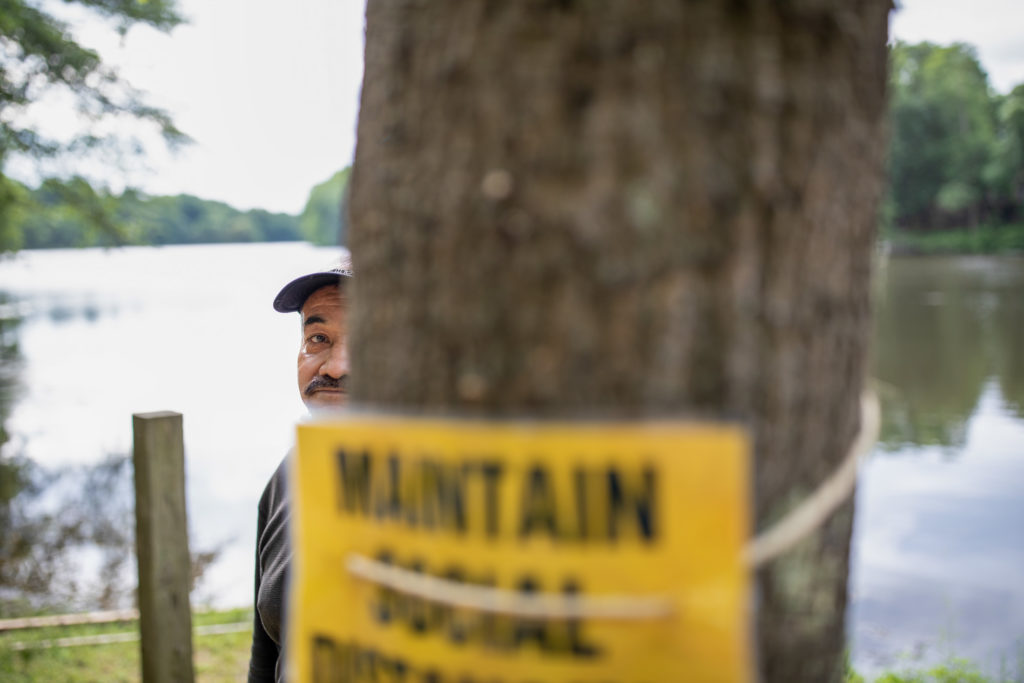
“When you get to Trump’s election and all the xenophobia, it’s a flashpoint.”
At 75, Rita Dentino speaks with a musical lilt. Short haired and freckled, she grew up in nearby Ocean Township outside Asbury Park and calls herself an ‘American mutt’. Fluent in Spanish, she is the grandmother of a 4-year-old with whom she has been FaceTiming, post-COVID. She used to volunteer in a Central Jersey activist group formed in response to the 2003 invasion of Iraq, but eventually joined an offshoot that aligned with Freehold’s Hispanic laborers.
Casa Freehold grew out of an ad-hoc coalition between an immigrant rights group formed by residents of Monmouth county and ‘Journaleros De Freehold,’ (Day Laborers of Freehold), led by Alejandro Abarca, a worker from Mexico. In the early 2000s, word got around that workers were available for hire at low wages in Freehold’s muster zone, making it a destination for contractors and workers alike. This irked some townsfolk who pressed the town council to prevent them from gathering. Things came to a head in 2003 when Freehold’s incumbent mayor, Michael Wilson, campaigned on an anti-immigrant platform, pushing for random home inspections that forced day laborers to stop looking for work. When protests and efforts to negotiate with the council failed, the laborers joined hands with supporting organizations and filed a federal lawsuit against the Borough of Freehold. The laborers won.
The court ruling permitted the men to return to the muster zone without fear of being ticketed by local police for loitering and panhandling. The laborers voted to pay a dollar a day from their daily wages to raise funds for a hiring center and related costs. “I was there every morning at 6,” said Dentino. “We would gather under a tree.” She took over when Abarca returned to Mexico in 2007 and remains unpaid.
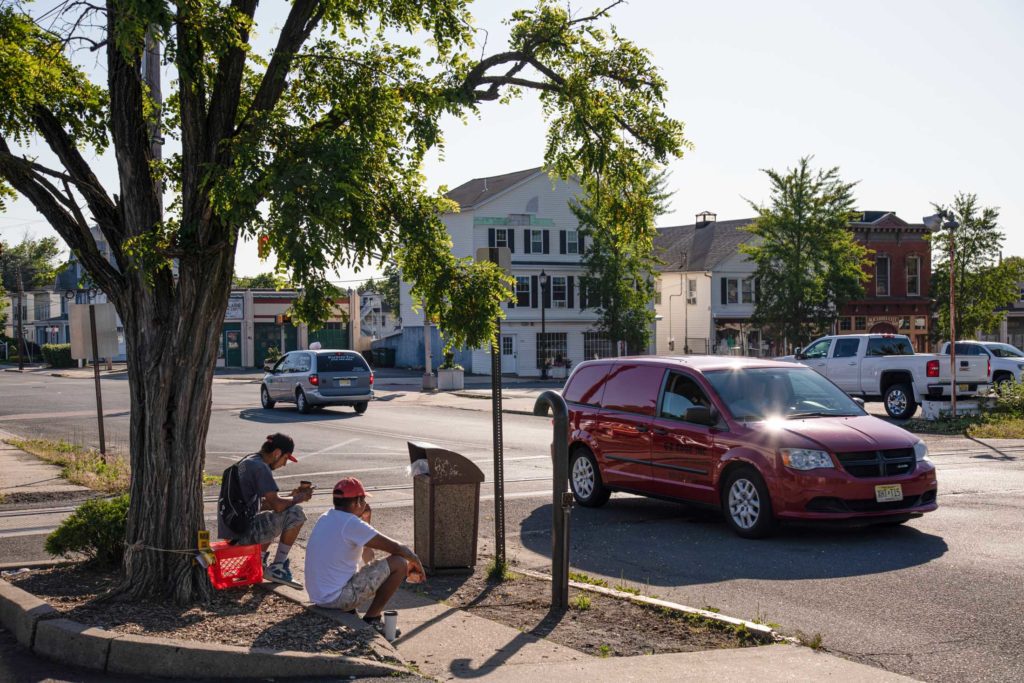
“It’s not a new practice by any means,” said Scott Smith, an attorney who grew up in the area and does pro-bono work for Casa Freehold, about day laborers gathering for work in Central Jersey’s town centers. Thirty years ago, he was a high schooler and remembers that land around Freehold in Monmouth County was primarily agricultural. “We all worked on these farms, but all the planting and harvesting was done by teams of skilled Mexican farmworkers and they wouldn’t let us touch anything,” he laughed. “We got to do nothing; just scut work. They would come up from across the border, work the harvest season, and go back home.” The practice was widely accepted when the labor market was strong, until the 2008 recession, after which the level of animosity began to increase. “When you get to Trump’s election and all the xenophobia, it’s a flashpoint.”
“They didn’t allow black men to stand there like that, and I don’t know why nobody didn’t take it to court. Or do anything for black people.”
Migrant farm labor has long been a commodity in and around Freehold, made available by ethnic groups to white farmers. From the 40s through the 60s, farm workers were mostly African Americans who moved in from Florida and Texas during the great migration from the South and Mexicans brought in through the federal government’s Braceros program. Norma Randolph is eight-six, African American, was born and raised in Freehold borough, and has lived here all her life, attending Court Street elementary school when it was segregated. As a young girl, she remembers seeing black families from the South living in makeshift camps when they came to work in the farms around Freehold, and entire families sleeping under canvas tarpaulins in the back of their trucks. The civil rights movement led to an exodus of black farm workers. Seasonal workers continued to arrive from Mexico through the 80s. By the early 2000s, their numbers had grown, and many were settling in Freehold Borough for its walkability and availability of housing.
Randolph is a member of the Baptist congregation at the only local church that opened their doors to the day laborers when the lawsuit against the town was in process, enabling Casa Freehold to set up a temporary worker center in their fellowship hall. “The borough didn’t let them sit or stand on Throckmorton…,” Ms. Randolph said about the workers gathering ‘on the side of the road’. “They had to move the workers all the way down towards Englishtown. I saw that for myself, and that went on for a couple of years, until our church took them in.”
In the 70s and 80s, she said, it was no different for black men gathering in the center of Freehold Borough than it was later for Hispanic men. “They didn’t allow black men to stand there like that, and I don’t know why nobody didn’t take it to court. Or do anything for black people. If you think they could sit on the curbs or anything like that, no no no. You couldn’t see black men gathering on Throckmorton street then. The cop would come along and say, let’s go, let’s go…”
…In ’65 tension was running high at my high school
There was a lot of fights ‘tween the black and white
There was nothing you could do
Two cars at a light on a Saturday night
In the back seat there was a gun
Words were passed, then a shotgun blast
Troubled times had come to my hometown….
Now Main Street’s whitewashed windows and vacant stores
Seems like there ain’t nobody wants to come down here no more
They’re closing down the textile mill across the railroad tracks
Foreman says “These jobs are going, boys
And they ain’t coming back
To your hometown.”
– Lyrics from Bruce Springsteen’s song ‘My Hometown’.
In 2004, finally entitled by the court ruling to gather for work, the workers who assembled outdoors under the trees in the muster zone got on La Lista—a list that regulated them to take turns at jobs and not outbid each other. Names on the list were called three times a day, at six, eight, and ten a.m. rain or shine, by Dentino, who trained laborers to take on the task of organizing their cohort. She said that the practice of calling the list was abandoned when workers began infighting. One of the organizers, a landscaper, was ‘worn out’ by men falsely accusing him of stealing the one-dollar donations that went into a bank account to provide for future expenses.
Councilwoman Annette Jordan spoke tentatively about the town’s relationship with its immigrant workers in the years since the lawsuit. “It’s been tough for the Latino population to assimilate but it is slowly changing,” said Jordan, recalling what she saw in 1998 when her son was in school. “The faces of his classmates were getting browner. Now we’re coming up to the second generation and that also changes the flow.” Explaining Freehold’s white residents’ initial hostility towards the laborers and their efforts to adjust to the demographic changes, she concluded, “It’s a learning curve. It’s not that we’ve come so far, we’ve come a long way.” She views immigrant laborers as essential workers but establishing a gathering space for them in Freehold is not a priority for local administration. “I’ve been on the council for two years, and that’s not something we’ve talked about,” she said. She pointed out that racial problems weren’t new to town and mentioned Springsteen’s song ‘My Hometown’, in which he sings wistfully about moving out of Freehold because of racial tensions and economic decline in the 60s, a song that Norma Randolph scoffed at, as fiercely as she scoffed at Springsteen himself. According to Randolph, he cut his teeth as a singer in his teens, performing with black kids in the African American community center on Broad Street but did ‘nothing’ for the black people who supported him. “I’m the one who has wrote him,” she said, “and he knows exactly who I am.”
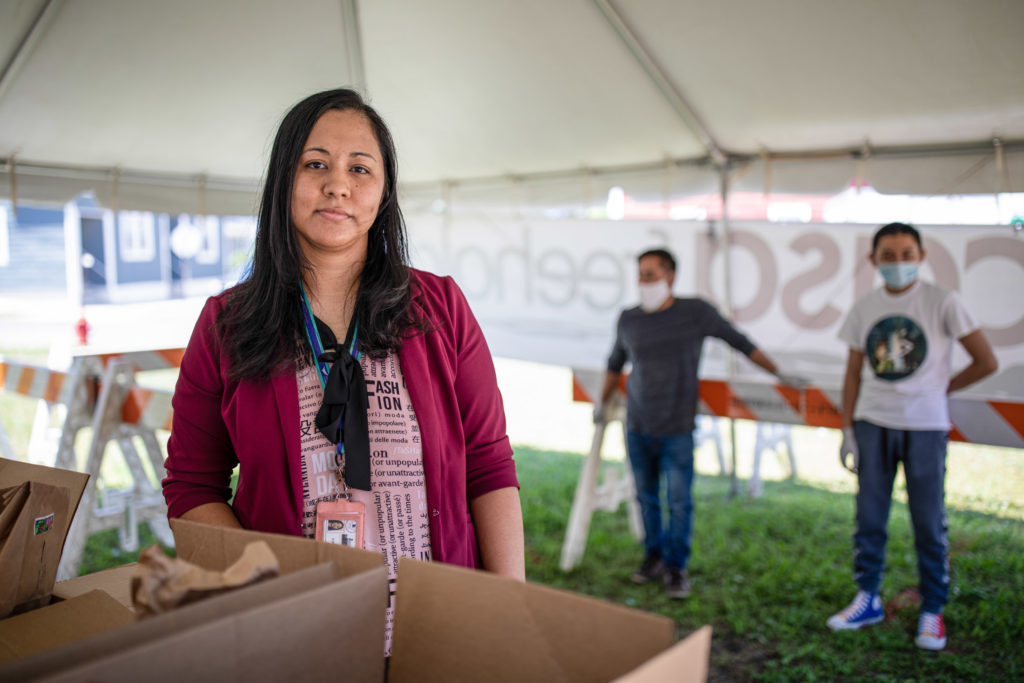
In February, sensing a crisis, Angelica Espinal-Garcia, a board-member at Casa Freehold and health educator employed by Freehold’s Department of Health, began conducting information sessions about the novel coronavirus in Casa Freehold’s office and local churches.
In late March and April, as cases began to rise, she found herself becoming a liaison between the town’s Hispanic residents and the health department. Responding to calls from workers experiencing symptoms, she directed them to screening and triage at the community clinic, and began advising concerned employers and ‘encargados’—middlemen who rent apartments to workers who live in shared spaces—about what she called the most frustrating aspect of her work, assuaging stigma around the virus in the community. Since encargados are not the actual homeowners, they charge high rents—as much as $500 per room—and can take over their renters’ lives, even holding their mail until the rent is paid. Workers are afraid to come out and self-identify, she said, “they’re afraid of the police, of being fired.”
The CARES Act, the government’s bailout to aid families affected by the pandemic, has failed low-income, undocumented immigrant populations, and according to its critics was designed to do so. Most egregiously, it has excluded tax-paying undocumented immigrants, many of who have children who are American citizens. Alicia Valeriano is one of them.
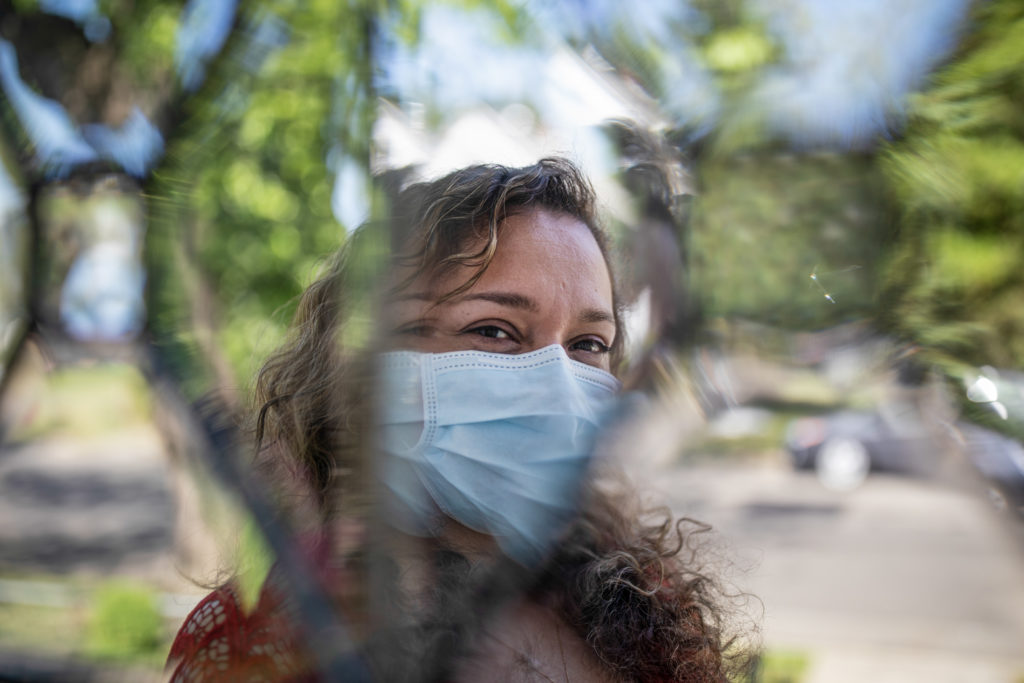
“I’ve lived here 20 years. I didn’t get anything.”
Valeriano, 43, has been paying taxes using an ITIN (Individual Tax Identification Number) for 18 of the 20 years she has lived in Freehold, since arriving from Mexico City. ITINs let undocumented workers pay taxes on their earnings, but do not entitle them to social security benefits. She spoke to me in the drawing room of a small, immaculately kept house she rents in Freehold Borough, where she lives with her husband, a day laborer, and their three children. Her youngest two were born in the United States and are therefore U.S. citizens. “I have these two children; they have to eat too, but we are left out. I am disappointed. I’ve lived here 20 years. I didn’t get anything,” she said, referring to the CARES act, which bypassed her family completely, for the sole reason that she is undocumented. The effect of the pandemic on workers like her is even more far-reaching. Valeriano has been saving for years to buy a house. She had a down payment ready and was approved for a mortgage taken in her nephew and daughter’s names. Her oldest daughter is a recipient of the Deferred Action for Childhood Arrivals (DACA) status. When the emergency was declared, her realtor told her their lenders would not proceed unless she could show stronger credit. At her request, I did not call her real estate agent to confirm this.
Three months later, she called her real estate agent again, to suggest that the mortgage be taken in her name, not her daughter’s. She was told that the rules had changed. The lender now worked only with clients who had social security numbers; since Valeriano is undocumented that wasn’t an option.
Valeriano’s husband contracted the virus in March and was unable to work for two months. Once he was well enough, he returned to the parking lot of the 6/12 to look for work, but without much success. Most day laborers in Freehold have seen employment decline from daily jobs to two days a week or less, with no income during the first weeks of the lockdown. According to Dentino, work slows down in the winter months, and usually begins to pick up in March. The lockdown extended the day laborers’ dry period through the end of May. Added to this is the endemic problem of wage theft that plagues undocumented workers. Eleazar, a kitchen worker who took time off during the lockdown because of falling sick with the virus, says he lost over $500 in wages that were owed to him. While it is against the law for employers to hire undocumented workers, once they have done so, they are legally obligated to pay them for the work they do. Even so, Eleazar was fearful of filing a complaint and exposing his undocumented status. He felt his only alternative was to find a new job.
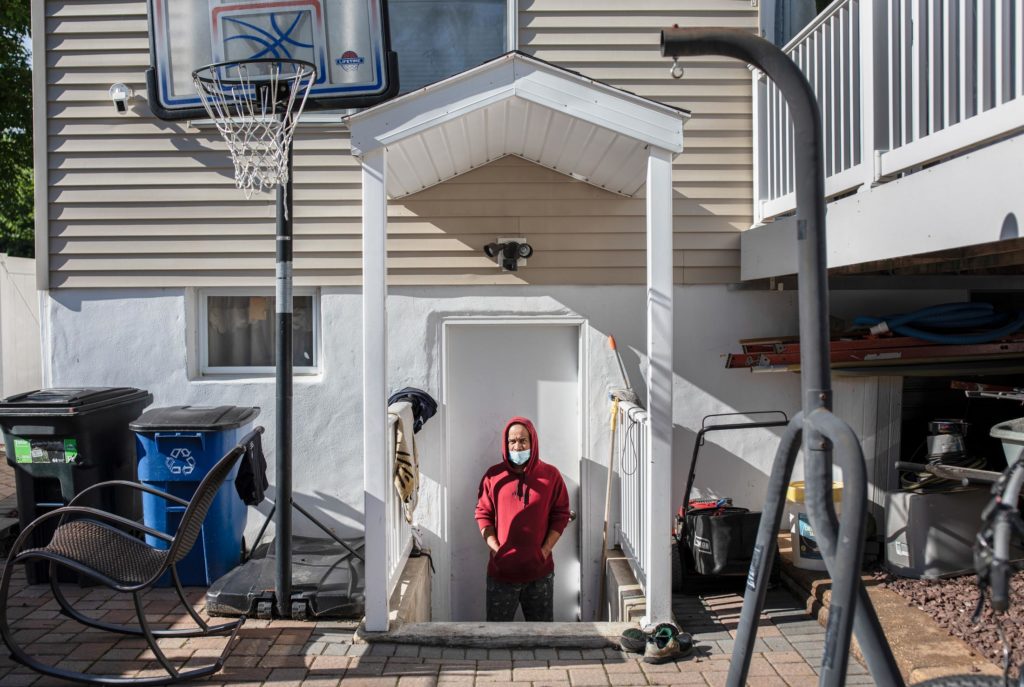
“I came here with no education. All of us Hispanics are like that. This is such an important theme for us. It separates us from Americans. They go to school, they’re educated, they have knowledge. You can’t compare us, because we’re two different things.” – Hernan, day laborer
“We’re working to push the government to recognize the essentiality of these workers,” said Dentino, “this bailout is the most Draconian, racist move I’ve ever seen. Our immigrant workers are those who make it possible for people to quarantine themselves, from people who mow your lawn to warehouse workers.” But a bill to bailout undocumented taxpayers has yet to pass in the state senate. Its equivalent on the federal level, the House’s HEROES act, is expected to face fierce opposition in the Senate.
On the ground, Casa Freehold has tried to educate workers to insist that contractors provide PPE and respect social distancing rules when transporting them—a single van that would ordinarily be packed with men should carry only one or two. This is difficult, with workers struggling to pay for food and rent. Governor Phil Murphy’s temporary anti-eviction order is currently in place, but as with all federal pandemic support to date, undocumented laborers are not benefiting . “Rent forgiveness does not apply to these workers; the bailout does not go all the way to the bottom. I’ve never seen that,” said Dentino. A worker from nearby Lakewood who came home from the hospital after recovering from COVID-19 was told to move out within a week by his encargado, who feared that he would infect other tenants. Casa Freehold intervened to prevent the eviction.
Evictions have not been limited to removal from apartments. On May 19th, during the pandemic, Dentino was in a Zoom meeting that was cut short when an attorney representing Hector Garcia Mendoza, a day laborer from Freehold, received a phone call alerting her that he was being deported to Mexico. Mendoza was detained by Immigration and Customs Enforcement (ICE) in March, soon after the emergency was declared. He had since become one of four plaintiffs in a class-action lawsuit demanding the release of all detainees at an ICE-operated detention center in Elizabeth, New Jersey, on the grounds that conditions in the center placed its inmates at high risk of contracting the virus. Two months later, without informing his attorneys and despite an emergency stay order, Mendoza was flown from Newark to Laredo, Texas. From there he was deported to Nuevo Laredo, Mexico, a region notorious for gangs and narco activity, in what his attorneys say is a retaliatory act by ICE.
Immediately after he was deported, the Freehold Borough police emphatically denied any role in Mendoza’s arrest by ICE, even though he was arrested as he left the Freehold police station. He had been charged for stealing copper pipe and was released the same day. This led to accusations that the local police did tip off ICE, and the town was hit with weekly phone-zapping campaigns by activists and intense media scrutiny. A few weeks later, it came to light that Mendoza and another man were released from the police station that day, and that the Freehold Borough police did indeed tip-off ICE, but about the second man, who had a criminal record. ICE picked up both men. The campaign to close Jersey’s COVID-hit prisons temporarily became a campaign to find Mendoza, with advocates contacting prisons and detention centers near the Laredo-U.S. border, on the off-chance that he might have been detained if he tried to cross back into the States. As I write these words, he is still missing.
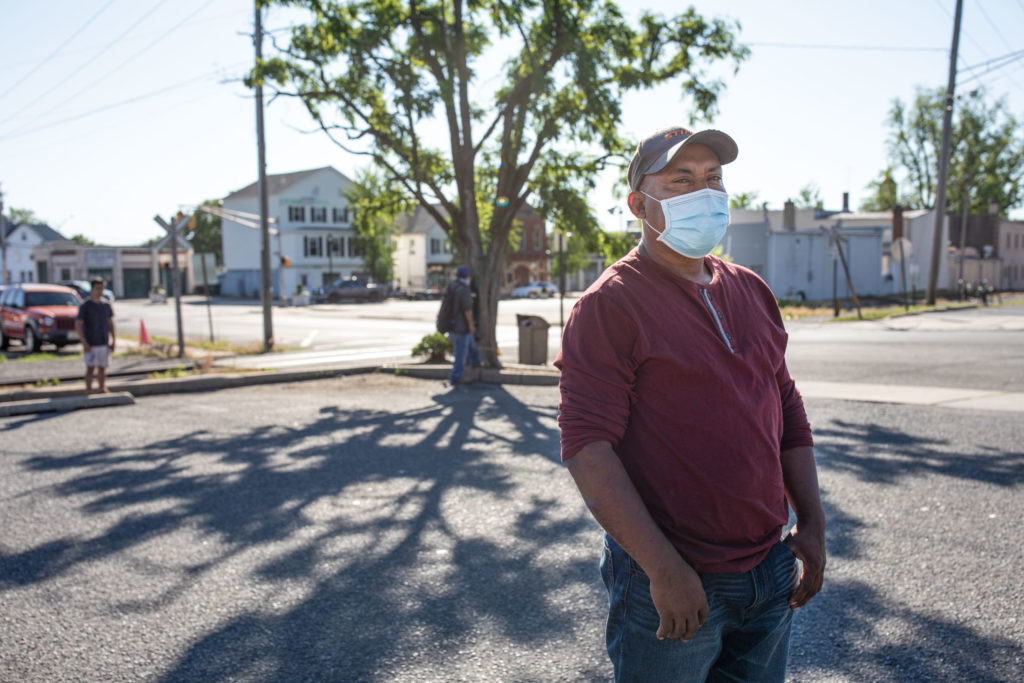
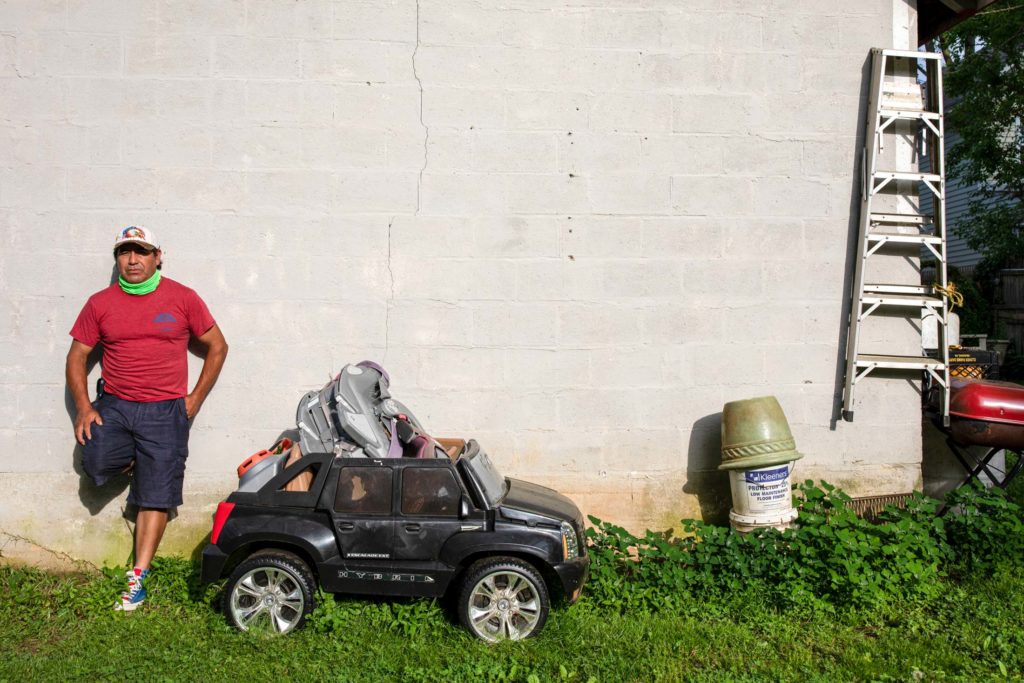
Councilwoman Annette Jordan attended a Casa Freehold volunteer meeting in July via Zoom. She and Dentino have discussed Jordan becoming a liaison for the town with Casa Freehold. According to a volunteer who was present at the meeting, and Dentino herself, the conversation got heated when Mendoza’s arrest by ICE came up. Dentino asked for Jordan’s cooperation in securing a written policy from the local police on what situations would prompt a call to ICE. Jordan deflected the questions. An email sent to her asking for a comment on the meeting was unanswered. A phone call placed to Captain Ronnie Steppat from the Freehold Borough Police, asking if his department had a policy about contacting ICE was not returned.
The pandemic sent Freehold’s Hispanic workers into a brief but scattered retreat from ICE, from renters and from the public eye, leaving them more isolated than before. The shadowy spaces they usually occupy were no longer available, in restaurant kitchens and in warehouses, and in gardens and backyards, where they vanish into the anonymity of their work. Though the threat of deportation changes with each administration—ICE operates with impunity under Trump but more deportations of undocumented immigrants occurred during the Obama Administration—the economic opportunities in the United States continue to outweigh the risks. The pandemic has been simply one more test of their mettle.
In a press release issued by Casa Freehold in 2006, after the laborers’ legal victory against the town, Dentino expressed the hope that the local community would find a place for its workers to gather, adding this: “We are saddened that the lawsuit was necessary.”
Fourteen years later there remains no town sanctioned site for its immigrant labor force to assemble. On a Sunday morning in late May, Dentino met me at the 6/12, Freehold’s unofficial muster zone for day laborers. The 6/12 opens early and is a natural stop for workers walking along the railroad in the early mornings for coffee and freshly made empanadas that are served from the store’s tiny kitchen.
Distributing cloth masks to the men waiting for work, Dentino chatted with the men she knew, and introduced herself to those she did not.
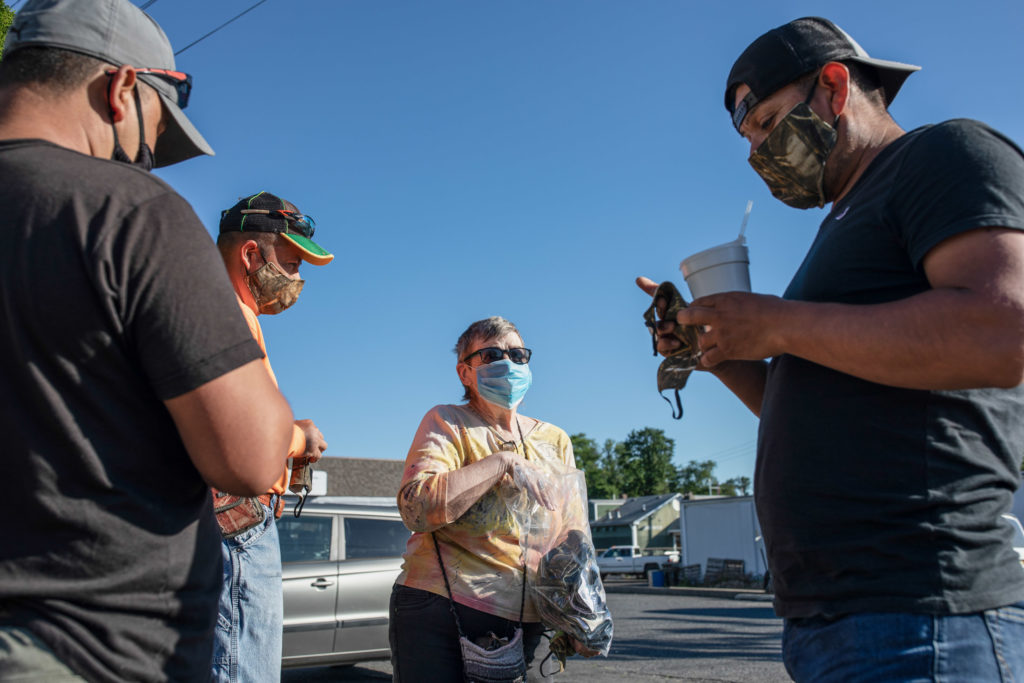
“They won’t come to me,” she said, knowingly, “I go to them.” She insisted they wear the masks; some humored her, others nodded and walked on. Dentino and I watched as a car pulled in and a group of young men scrambled into it, the promise of paid work outweighing the threat of the virus.
I stepped into the 6/12 to ask its owner, Manjeet Singh Minhas—’Manny’ to the workers—how he felt about his premises becoming a de-facto safe space for day laborers. “I’m an immigrant myself,” said Singh, a dark-skinned, middle-aged man from the state of Punjab, in northern India, “I don’t have a problem.”
Singh permits the men to gather inside his store when the weather is bad, which irritates some Freehold residents. “I’m not responsible if people are offended by them,” said Singh. A Google reviewer complained that a laborer did not hold the door open. He shrugged, “Why should he?” The men wire money from his store, often on a monthly basis, to their families back home. Singh observed that since the pandemic, the number of men coming in to do so has dropped. In April and May, many came in to collect money that their families wired to them, instead. He’s never seen this happen on such a scale. “They work hard. They’re here every morning.” he said, gesturing to the parking lot but alluding also to the laborers’ lack of financial and social mobility, “they’re not going anywhere.”
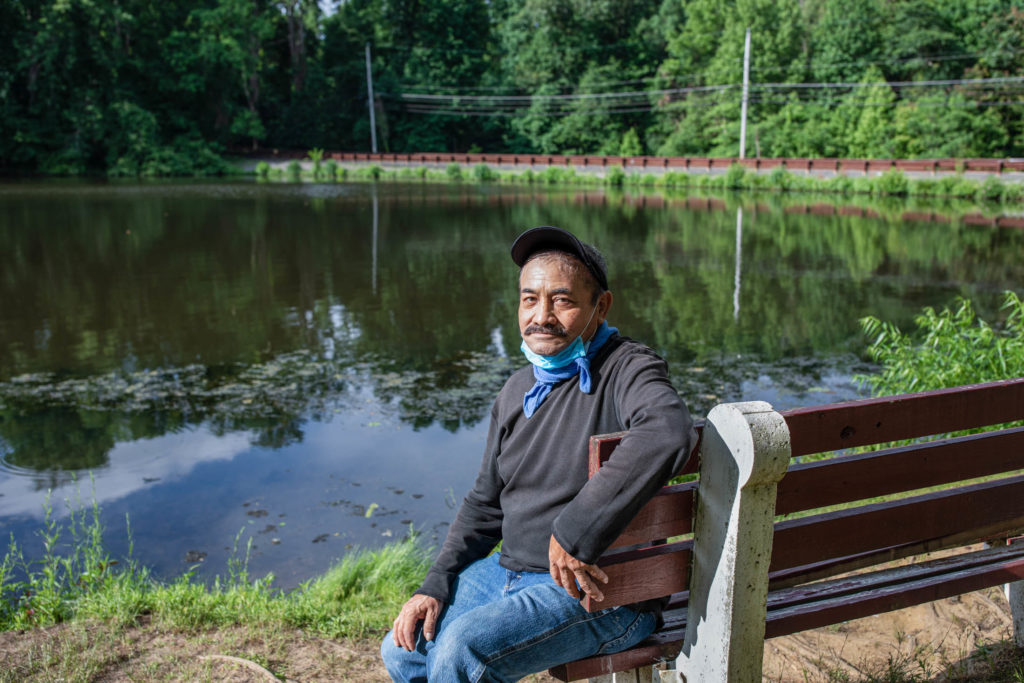
*While the word ‘LatinX’ is preferred in many circles, the writer chose to use the term ‘Hispanic’ to describe the workers in the story because this term best reflects how they refer to themselves.
Their Stories
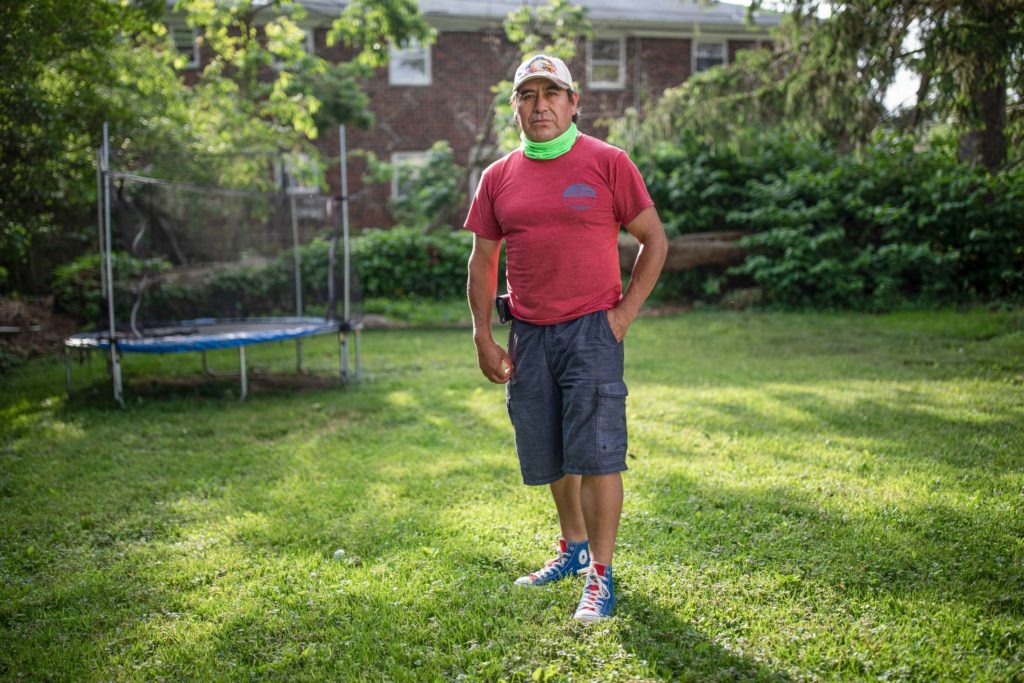
Mario R*., Day Laborer
Mario (52), a day laborer and landscaper, is from Puebla, Mexico. “I am afraid of the water,” he said, shyly, with an apologetic smile, about his decision to avoid crossing to the US via the Rio Grande. He crossed over through the desert instead, in 2006, and arrived in Tucson, Arizona. A cousin had told him about plentiful work in Freehold. He arrived here by car after a journey of five days and five nights with other immigrants.
He spoke to me from the backyard of the house where he rents a single room. There were patches of mint and an evergreen pruned to a perfect spiral. He brought it home one day in his wheelbarrow, when a client did not want it anymore. “It was too pretty to throw away,” he said. He keeps his tools—the wheelbarrow and other implements—against a wall, beside the patch of herbs and flowers he tends.
Since the lockdown, his work has dropped to one or two days a week. Before the pandemic, he was able to wire up to $400 a month to his family in Puebla. This April he sent them 100$, in May, 150$. The pandemic has scared away even regular clients. No longer do they give him a ride in their vehicles to their houses; twice now, he has biked one hour each way to jobs in nearby towns.
In 2019, he was walking home from Casa Freehold when local police stopped him without cause and asked his name. When he hesitated to immediately disclose it, they took him to the police station, from where he called Rita Dentino, executive director of Casa Freehold and an old friend. She went to the police station immediately and filed a complaint with the ACLU. Mario, who has no criminal record, was released without either party pressing charges.
The pandemic has forced Mario to consider returning to Mexico within a year. He is simply not able to make ends meet. “I am tired,” he said. He has a wife, eight children and grandchildren back home. He plans to leave when he has earned enough to buy a plane ticket home. “This country is beautiful. But for immigrants, it’s not easy.” Tears sprang into his eyes. “The people are listening to the president, and so they say, ‘Mexicans are no good.’ Sometimes I am scared.”
Alicia Valeriano, Shift Supervisor/Pharmacy worker
Alicia Valeriano, 43, is from Mexico City. She was working almost 80 hours every week at three different jobs: waitressing, painting tiles, and as a cashier. In addition, she is pursuing a GED. She lost both her part time jobs during the lockdown, but still has 40 hours of work weekly as a permanent employee at a major pharmaceutical chain. She has worked hard and saved money for as long as she can remember. Alicia laughed, recalling how she got her first job exactly a day after she arrived in the States, working at the travel agency she had dropped into to make a phone call to her mother in Mexico City.
She and her husband have three children, two of whom were born in the US, making them American citizens. Despite her excellent record as a taxpayer, and her children’s legal status as American citizens, her family did not qualify for financial relief under the federal government’s CARES Act. The act has been widely criticized for excluding taxpaying undocumented immigrants and their families.
Valeriano met us in a small, tidy house she rents, complete with a backyard and a hammock and two cats. Her embrace of the American life is complete; she has learnt English and has been saving to buy a home. Her husband, a day laborer, was infected with COVID-19, and lost two months of work. Before the pandemic, Valeriano had only to worry about providing dinner for her children. Now, on a single income, she provides breakfast and lunch to the children, meals they previously received in school.
“The children see that you’re nervous about the money. They see you walking back and forth, and they notice it,” she said.
Though the CARES act hurt her, nothing has disappointed Valeriano more than having to postpone her dream of buying a home. The pandemic played a role in this. Valeriano had a down payment ready and was approved for a mortgage taken in her nephew and her 23-year old daughter’s names; her daughter is a recipient of the Deferred Action for Childhood Arrivals status. When the lockdown occurred, her realtor told her their lenders would not proceed unless she could show stronger credit. In June, Valeriano called her realtor again. She was ready to put down a larger down payment and take the loan in her name now. But the realtor had news for her: the rules had changed since the pandemic, and the lender was no longer working with buyers who did not have social security numbers. Valeriano is soft-spoken and reserved, and in her quiet voice, insisted to me over the phone, that she was disappointed but not deterred. “I’m not going to let anyone come between me and my dream,” she said. “I’m going to find a way to buy a house.”
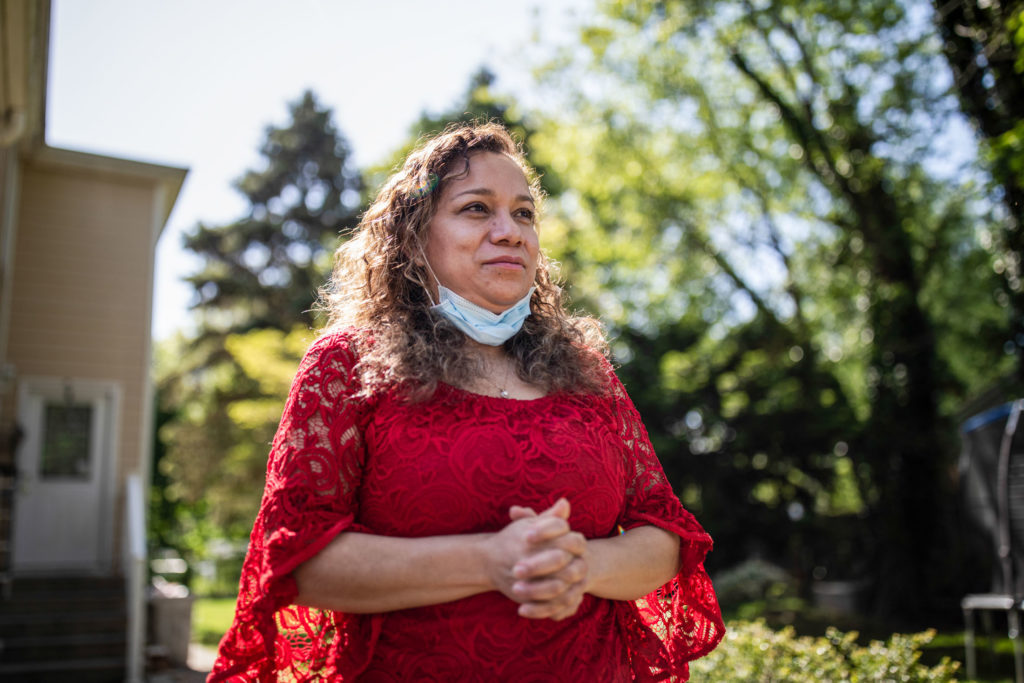
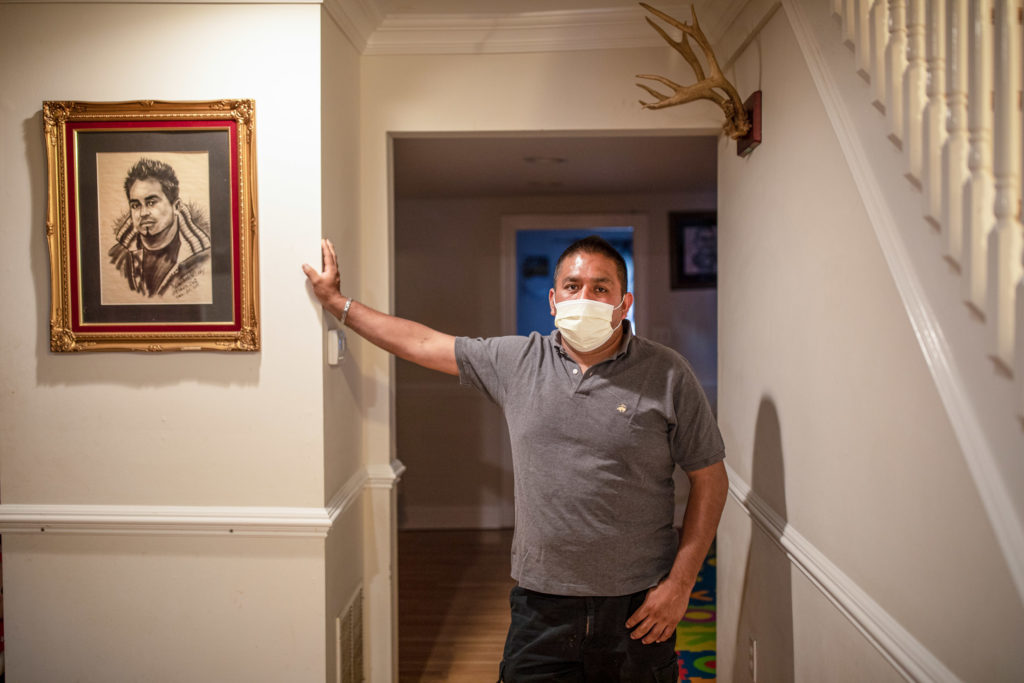
*Oscar M., Day Laborer
Oscar, 45, arrived in Freehold in 2007 from Mexico City. In 2019, he began working independently; prior to this he worked for various construction crews. “I always liked my job, the people I worked with liked my work. I wanted to depend on myself, since I am good at what I do,” he told us. Until the lockdown, his old clients called him, and he would receive referrals from friends. Early in March, he began feeling ill and had trouble breathing. A week later, feeling very weak, he went to CentraState Hospital in Freehold, where he was diagnosed with COVID-19. He was admitted and kept in isolation. He has type-2 diabetes which put him at higher risk for severe illness from the virus. He learnt about the lockdown and the surge of the pandemic in New Jersey from television screens in hospital. He was intubated and released two weeks later upon recovery. Soon after, his wife, a domestic worker who cleans houses in Lakewood (many of the Orthodox Jewish community’s homes in Lakewood are cleaned by Freehold’s Hispanic women), also caught COVID-19. Her symptoms were milder, and she recovered at home.
“It was very sad; I didn’t know what to think. I thought I wasn’t going to make it. I had no strength left after I was released from the hospital,” he said. He is thankful that his wife continued working when he was in hospital. Between her earnings and their savings, they are able to support their family. Undocumented workers who pay taxes receive an ITIN (Individual Taxpayer Identification Number)—similar to a social security number. Oscar said that he has an ITIN number and has been paying taxes for two years now, with his wife; he thought he would receive a refund from the IRS but did not. He suspects that his tax consultant duped them.
Since returning from hospital, he worked for one week, and made enough to cover the family’s rent. He hopes that work will get busier. Meanwhile, the hospital bills are coming in, some with a notice of delinquency. “One is 1500/-,” he said and shook his head. He hopes to pay them off in installments.
Of America and his life here, he said, “It is a country with a lot of work, but the work doesn’t come to you. You have to look for it, and when you got work, you can go out and enjoy with your family.”
He crossed over to the US over 8 days in 2007, walking through the desert, leaving his wife at the time and two children behind in Mexico City. His daughter was 12 and his son, 10. He has not seen them since. Oscar hopes to secure a work permit through the U visa that his wife (this is his second marriage) has applied for, to be able to visit his grown children and return to the family he has in Freehold.
Though his 4-year-old son and 3 stepchildren are American citizens, his family was among those excluded from the CARES Act.
Angelica Espinal-Garcia, MPH, MCHES, Health Educator
As news of the novel coronavirus began to spread in February, Angelica Espinal-Garcia (36), a health educator for Freehold’s department of health and president of the board of Casa Freehold, began holding information sessions at local churches and in the offices of Casa Freehold on Jackson Street. “There was a lot of interest,” she said, “I felt that people were looking for me.” She advised them on what symptoms to look for, and what precautions to take, using guidance from the CDC, before the pandemic was declared a national emergency. Now, she is a liaison with the Hispanic community, helping them navigate the health care system when they call her or Casa Freehold with questions about the virus.
Her previous job at a large apartment leasing agency in town had already made Angelica a familiar figure to locals. “I try to listen,” she said, “so they can tell me. Trust is very valuable in the Hispanic community.” At the end of the initial surge of cases in Freehold Borough however, Angelica found herself dealing with a unique situation among workers who had recovered from COVID-19. Social stigma and fear within the community was preventing them from returning to their jobs and their living quarters as employers and the middlemen who rent to them—the ‘encargados’—required assurance that the workers were not contagious. “I get calls all the time,” she said, from desperate workers. She reaches out to their encargados. “Your renters are not the only people you can get it (the virus) from,” she tells them. “We’re Hispanic, we should support each other.”
Angelica is from Honduras. Her parents separated and her mother left for the US to escape political violence when Angelica was seven. Angelica’s grandmother raised her. She arrived in the US when she was 16 on a petition from her father, who is a citizen. Now an American citizen herself, Angelica was able to sponsor her siblings. They arrived in New Jersey in October 2019 and her mother was re-united with her daughter, Angelica’s stepsister, after 29 years.
“When I see inequities in the health system, to be honest, I see my parents, because I have seen them struggle,” she said. “I feel I’m doing the right job. Just talking to the patients’ co-workers, and to their encargados. They’re scared, they want to get the people out of the house if they tested positive. I feel I’m making a difference. I have seen good outcomes. In public health a lot of our work is backstage, but I do see an impact.”
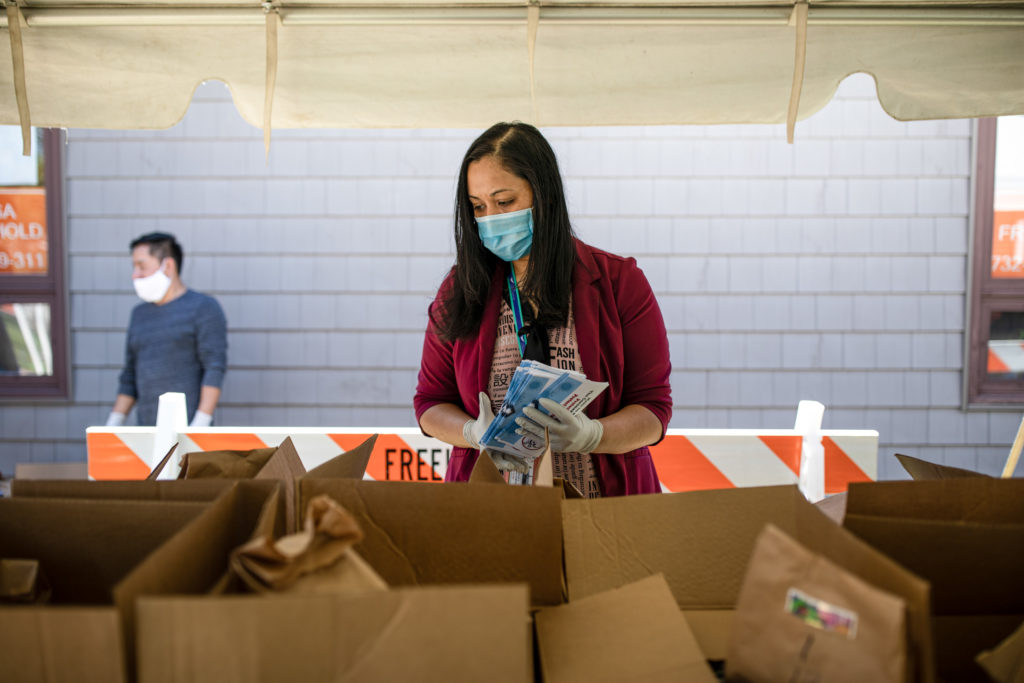
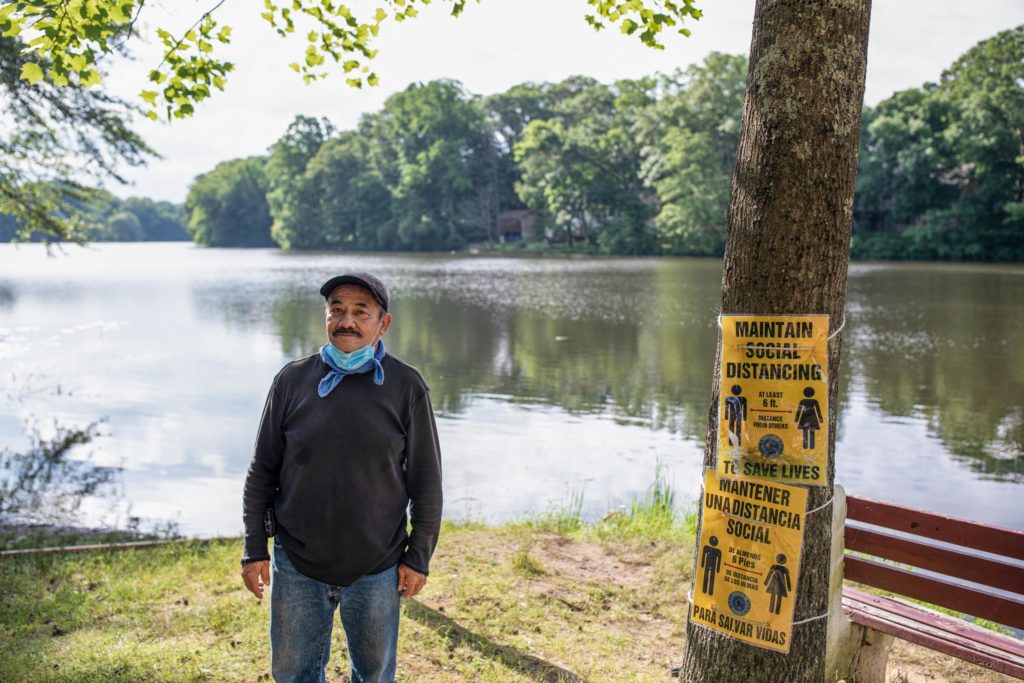
*Federico M., Day Laborer
Federico (66), has been in Freehold since 2008. He is from Puebla, Mexico, where he upholstered car interiors. Despite the perils of crossing the border, Federico is among many migrants who travel back and forth between the US and Mexico, staying for years at a time. He came to West Virginia in 1998 and returned to Mexico after two years. In 2008 he arrived in Freehold because of the promise of plentiful work. The second trip through the Sonoran Desert lasted five days and was a brush with death for Federico. “My legs gave out,” he said. His food and water ran out and he fell behind, unable to stand up and join the other men. His smuggler or ‘coyote’ came back for him with water and medicines that gave him the energy to walk. He was told to follow a trail of garbage and items shed by those who came before him—or risk getting lost. He crossed over into the States somewhere east of the border with Tijuana.
Federico worked a factory job with a plastic manufacturer for several years before switching to groundskeeping at the raceway in Englishtown, a few miles away from Freehold. The raceway usually closes in the winter months. Now, with the pandemic, it remains closed and Federico has not worked since March.
In mid-March he was infected by the virus and checked into CentraState Medical Center in Freehold, where he was intubated and treated. The nurses pitched in to pay for his taxi-ride home when he was released from hospital. Casa Freehold arranged for funds to pay for his medicines and delivered food outside in the house where he quarantined.
News travels fast in a town as small as Freehold, and it was not long before word spread among fellow workers that Federico had been sick. “After they know you have COVID, they don’t want to have anything to do with you,” he said. Leaving the hospital with no prospects for work, no home to go to, and no money to send his family was a moment of reckoning. At the end of this year, Federico plans to return to Puebla. He has, after all, fulfilled his dream of building a house for his wife and four children, and has paid for their education. “I feel like a cat with nine lives. I got two chances at life—once in the desert, and now after COVID,” he said. “Going home to Mexico will give me another chance to live, another start.”
*Gregoria R., Domestic worker/ House cleaner
Gregoria (52), a domestic worker, left Puebla, Mexico, in 1992 for the US. She came directly to Freehold after crossing the border, to join her father who was already there, working as a day laborer. Her first job was at a greenhouse in Colt’s Neck, then as a busgirl at a local restaurant.
In her first months in Freehold, she walked around town, hustling for work. “I could not speak much English,” she said, “but when I met people I asked—you need me?” She worked for 10 years in the dry-cleaning business, keeping 8-hour days, 6 days a week, operating pressing machines for men’s shirts in very hot conditions. She quit when she developed chronic pains in her neck and back.
Since 2010, Gregoria has been cleaning homes for the Orthodox Jewish Community in Lakewood, New Jersey, south of Freehold. The number of Hispanic women who clean houses in Lakewood is so high that Casa Freehold offers classes on how to work in observant Jewish households. Before the pandemic, Gregoria was able to work 5 days a week, cleaning 2-3 houses a day. When news of the virus began to spread, some employers began asking her as she came into their houses if she was sick or experiencing symptoms. In March, when the lockdown began, they called and told her to stay home. “I lost all my former employers,” she said, “They just don’t call me.” Feeling desperate, she texted an old employer, asking if she could come back. With her help, Gregoria returned to work in the first week of June. Unlike before COVID-19, now she has no guarantee of a schedule.
Gregoria raises her two school-age daughters in the second-floor apartment of a tiny house on Court Street. Sixth-grader Mari translated for us. Gregoria was able to pay rent for April, but not May. Governor Murphy’s anti-eviction order protects renters who lapsed on rent during the lockdown, but the rent is not forgiven. “I feel stressed all the time—there is stress in my head,” she said. She takes a bus to Lakewood and back, paying $3.80 for a ticket each way. She and the other women from Freehold walk from house to house, earning an hourly wage between $10 and $14.
I later found out that Gregoria’s husband was deported to Mexico on charges of domestic violence. Casa Freehold intervened on her behalf to file a ‘U’ visa, which is awarded to victims of domestic violence. In 2011, on the date she was to appear in court, Gregoria went to work, missing the single appointment that could have put her on a path to citizenship. She is not alone in this. Many undocumented immigrants are overwhelmed or simply frightened to choose between putting a day’s wages on the table and showing up in court to speak for themselves. Does she regret it? I asked. “Yes,” she nodded, “but I didn’t understand at that time how important it was, and I had the pressure of working to pay my bills.” Wistfully, she added, “Now I know.”
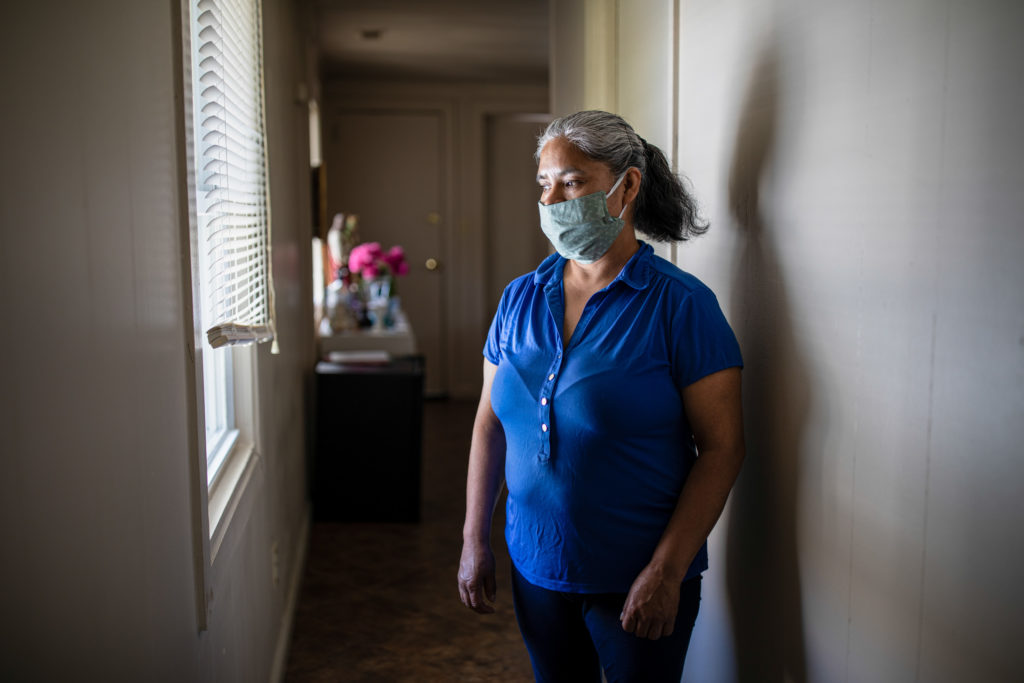
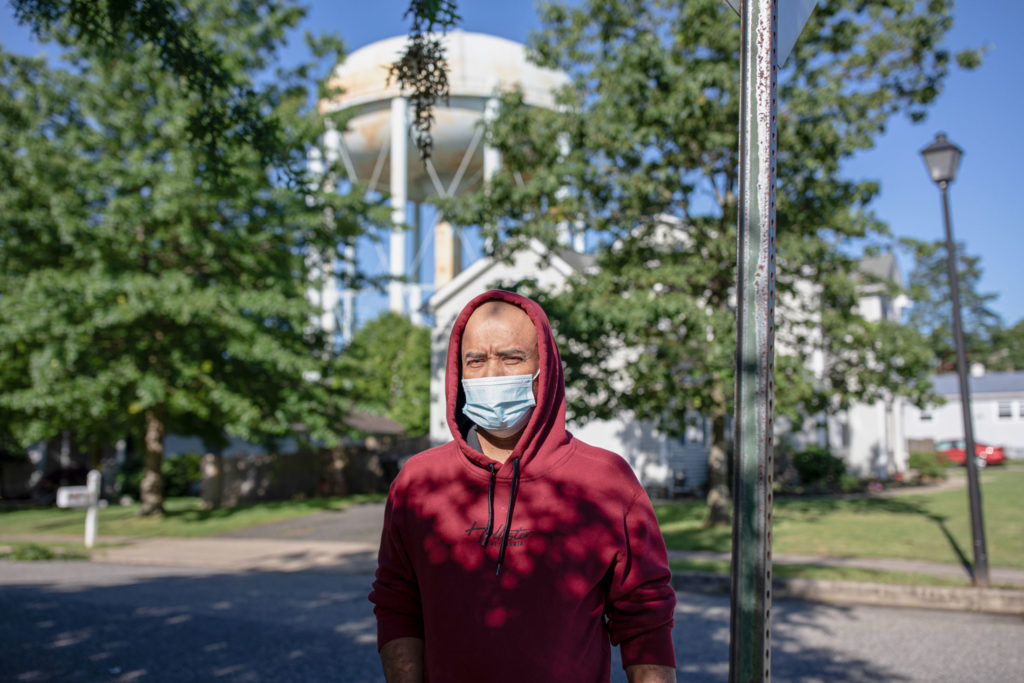
*Eleazar H., Kitchen worker
Eleazar (45), is from Oaxaca, Mexico. He has worked in the same restaurant on Main Street in downtown Freehold since 2004. It has had several different owners over the 16 years, and Eleazar reeled off the names of some of the dishes he’s learned—American, Italian and Indian. Though he could earn more as a day laborer, he prefers the security of kitchen work. He got his first and only raise six years ago, from $250 a week to $550.
In 2016, the restaurant changed hands again. Eleazar’s new employers paid his wages a week late, so that he was always short one week of pay. Employers of undocumented workers often withhold wages in the form of a “deposit” that is actually a bond intended to keep workers loyal. When the lockdown occurred Eleazar asked for his deposit to tide over the month of March. He was refused. Still, he went back to work on take-out orders. A week and a half later, feeling feverish and cold, he went to a doctor to get tested for COVID-19. The test came back positive and he began treatment. He has since recovered, but he suffered malaise and panic, with sleepless nights spent pacing outside the basement apartment he shares with two friends.
In June, after two months at home without pay, he got a call from the chef at the restaurant. The restaurant was re-opening, the chef said, but Eleazar needed to prove that his “body was clean” before he could come back to work. He asked Eleazar to get tested again. By now, with help from Angelica Espinal-Garcia, a health educator, Eleazar refused to get re-tested. There was no guarantee that the results would be negative, even though he had recovered: “No more, I told him, no more.” He wasn’t coming back; he told the surprised chef. He was more than a cook at the restaurant; he was their handy-man, plumber—an all-in-one guy—but his wages never reflected this except for occasional extra cash.
Eleazar is now working a new job at a restaurant in Manalapan and paying off bills for his treatment. Of an additional $700 his employers owed him in back pay, he was paid $250. The wage theft that Eleazar experienced for years came to a head during the pandemic. It forced him to find new work, yet it could happen all over again.
*Last names have been omitted, to protect the identities of these individuals.
